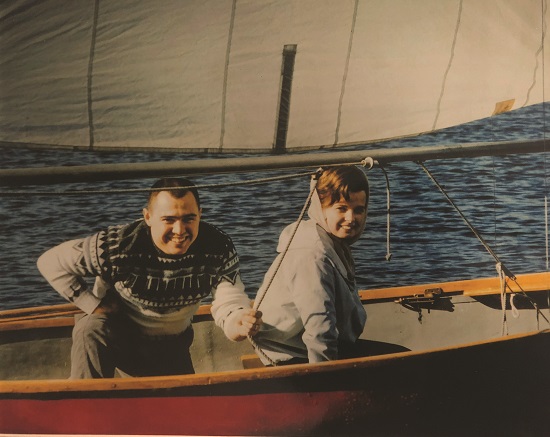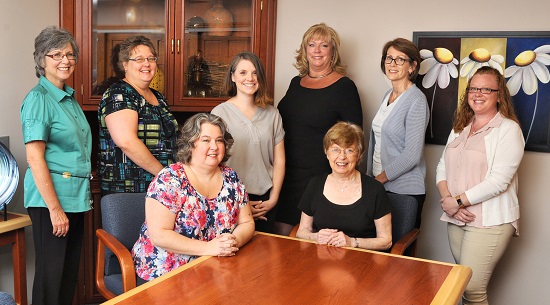Darlene Kittredge, CPA, on her 50 years of experience in the profession and what she does in her "down" time.
Family: Husband Lloyd (sailing enthusiast and accredited marine surveyor), 3 kids, 6 grandkids
Pets: 2 golden tabby cats, Port and Starboard
Alma Mater: Valparaiso University, accounting major and German and Economics minors
INCPAS member since: 1967

You’ve been a CPA for 50 years and are still practicing—where do you work currently?
I have my own firm, Kittredge & Zehner, P.C., in Chesterton. We have a staff of 10, and my oldest daughter, Kari, is my partner and the “Zehner” in our name.
Being partners with my daughter works very well. My practice has always been very important to me. I had explored some other possibilities for partners but couldn’t find anyone who had the same attitude about the clients, profession and employees as I did. She had done a little accounting here and there while she had small children, then started working with me and decided to sit for the Exam. She has now been working here for 15 years and has been a CPA for eight years.
Back then, you were supposed to be a teacher, a nurse or a secretary—that was it. I don’t think anybody took me seriously when I said I was going to sit for the Exam.
What are your interests outside of work?
I’m an avid reader. I like to do jigsaw puzzles and travel, but due to large amount of time spent at the office we don’t do too much of that.
I have six grandkids. They call me “Nammy,” and every year each of them gets a “Nammy Day” where they get to pick how they will spend the day. My 19-year granddaughter chose skydiving this summer, so we’ll be doing that soon. We’ve gone hang gliding, attended plays, the opera, Blue Man Group, museums and the zoo. They all pick something that’s a lot of fun.
Why did you choose accounting and getting your CPA?
I started in college as a chemistry major and was a bit disillusioned because I didn’t know what to do with the degree. I considered pharmacy, but they didn’t offer that program at Valpo so I would have had to transfer. At the end of my freshman year, a friend of mine suggested I take an accounting course. He was going to be a CPA — I didn’t even know what a CPA was. So I took the course and was hooked. I fell in love with it right away. After my senior year, I started working at a local CPA firm.
What did your family and friends think about you pursuing such a male-dominated profession for the time?
I had two older brothers who taught me how to be tough. Even if I had been a chemistry major, there were still very few women in that field. Back then, you were supposed to be a teacher, a nurse or a secretary—that was it. I don’t think anybody took me seriously when I said I was going to sit for the Exam. It was sort of like “yeah, right.” My husband and I were recently married, didn’t have kids yet and were having fun, so when I told him, he was supportive and also said, “That’s okay, as long as it doesn’t interfere with sailing and partying on weekends.”
When I told my employer I planned to sit for the Exam, he said there’d be no studying on company time. Meanwhile, a male coworker of mine was relieved of his client workload for three months to study at work or home.

Did you face any discrimination with colleagues or clients after starting as a CPA?
I tended to look young for my age, and one of the clients said to my immediate boss “Does this little girl know more about accounting than I do?” My boss said, “Yes, that’s why I’ve assigned her to you.”
But overall I think the reverse was true. There were people who liked the idea of working with a female CPA. In the 1970s, more women started becoming involved in businesses and financial decisions.
Do you face any discrimination now?
None whatsoever. I think that day has passed, fortunately.
Was there any standout individual who helped you progress in your career?
When I graduated from college, I was smart in that I knew nothing. I had all this academic training but didn’t know how it would translate into being productive in the real world. My coworker, Dolores, was a great accountant, but she didn’t have a degree and resented the college students who thought they knew everything. She took me under her wing and helped me pull together the academia and real world.
Do you have any best or worst memory about studying for and taking the CPA Exam?
As far as studying was concerned, if there was such a thing as the Becker course or something like it at the time, I didn’t know about it. I didn’t know how to approach the Exam, so I pulled out college books and studied an hour each morning before going into work since I wasn’t allowed to do so on company time. I didn’t have a clue what I was doing. Several hundred people took the Exam with me the first time. Only three were women, and I was the only young one. I’m not a crier, but when I got my scores back, I did have a private cry because I had failed all four parts. Then I looked at the scores and thought “You know, for someone who didn’t know what she was doing, these scores aren’t that bad.” And it gave me a better idea how to prepare for it.
What was the best advice you received, either while you were a student or CPA?
Right after I became a CPA, I worked part-time for 13 years because I had three children within a five-year period. Being a CPA was important, but being a mom was more important. I went back to work full-time when I was 39, and it became apparent to me I wouldn’t become partner at the regional firm I was in. I was exploring options and had a number of people in the profession suggest I go on my own. That was kind of a scary thing to do, but I had some really good encouragement to do it, and I’m very glad I did. Having my own practice has been very satisfying and rewarding.
What has changed most between when you first started in the profession and now?
Absolutely the computerization. Technology was not a thing back then, and I think it has changed the field tremendously. With AI coming on the scene, it’s going to change at an even more rapid pace.
In what ways do you feel you’ve innovated to keep up and ahead as a CPA?
I constantly research and digest all the changes that go into effect. I use the computer on a very minimal basis because it’s not a huge strong suit for me. Due to a childhood injury, I have to type mostly with my left hand. It’s not very effective, but I’ve got very skilled employees who can help. I know enough that I’m not a burden on them and bugging them for everything that needs to be done. I can trust them to handle projects like financial statements and long correspondence.
What tips do you have for young professionals just starting out?
Be realistic in evaluating your strengths and your weaknesses. Work on your weaknesses only to the point that weakness doesn’t become a burden to others or a hinderance to your progress. Your time is better spent in other areas you can do well in. Minimize your weaknesses and really build your strengths.
Now that it’s almost a 50-50 split among women and men entering the profession, what do you think it will take to start increasing diversity as well?
I think what the Society is doing with high school students is very important, but you have to remember these things take time. I was surprised at the Celebration this year when people were being recognized for passing the Exam—it was still about 60 percent white males. However, when you think back 50 years, when the profession was 99.9 percent white males, so we’ve made a lot of progress. We can’t be too impatient. Working with these young people—it will happen. It’s just going to take time.
What non-technical skill helped you most (communications, networking, critical thinking, etc.)?
I’m a big believer in a liberal arts education. Technical knowledge is a good introduction to the workforce, but almost nothing I learned in accounting back then is pertinent today. Other courses like speech, psychology, history, math, a foreign language—I minored in German—what I learned from those classes is still extremely relevant now. Debating is also good because it helps you think on your feet. These skills have lifelong applications. When you develop those, you can problem solve and communicate in the technical areas.
Why is it important to be involved with a professional association throughout your career?
I can take the train to Chicago, drive to Detroit or drive to Indianapolis in all about the same amount of time. I still take most of my continuing education courses in Indianapolis because I have felt over the years the Society does a much better job of attracting quality discussion leaders. It has been very beneficial in my continuing ed.
Plus, it’s very important to me to put on my stationary that I’m a member of the Indiana CPA Society and AICPA. Even if someone doesn’t know exactly what I do, they know it takes a lot of work and high standards to be part of those organizations. It lends a lot of credibility.
What are your plans for retirement?
Well, my daughter Kari says I’m semi-retired because sometimes I leave the office at 4:30 p.m. on Friday.
At some point I’m absolutely going to take a physics course. I always concentrated on math and science, and courses I needed to learn conflicted with other courses I wanted to learn.
I might volunteer at the library. I loved reading to my children and to my grandchildren. I could read there or help with the adult literacy program. Get more involved with church organizations. More traveling.
When work isn’t fun anymore, I’ll retire. But for now I have employees I love and clients I’ve worked with for more than 40 years and multiple generations within those families. They’ve become friends, and I’d miss that contact.
